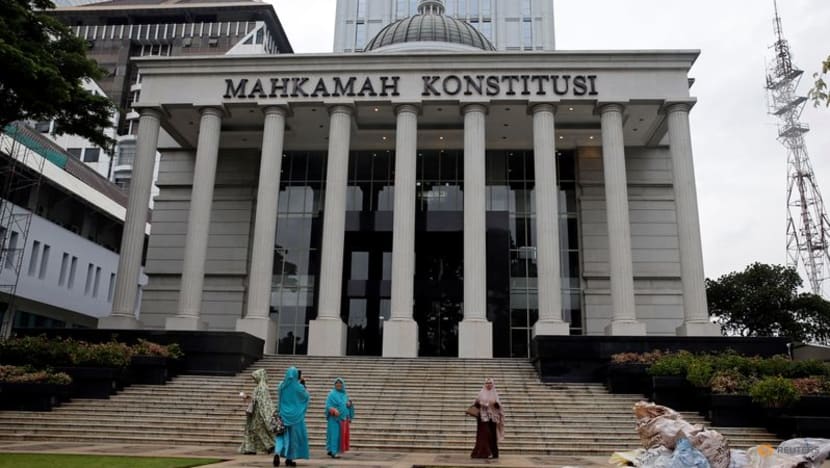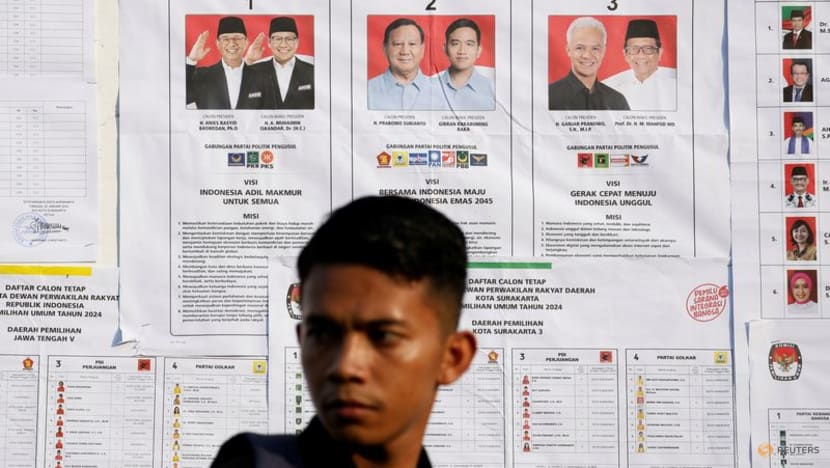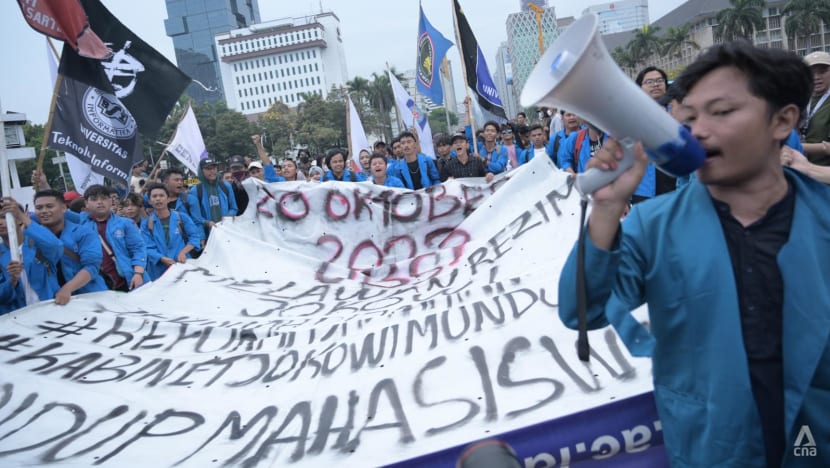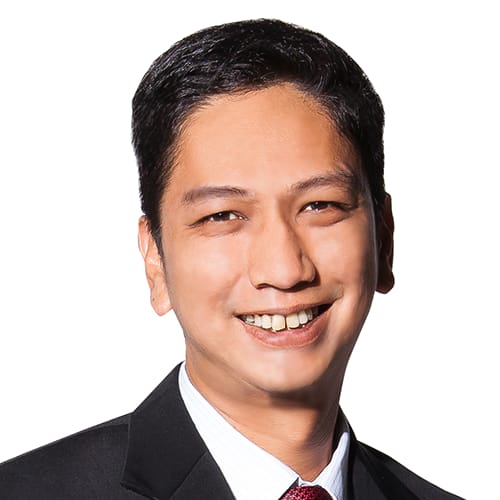analysis Asia
Court decision on nomination of Indonesia presidential candidates could reshape future elections but potential pitfalls lurk
Indonesia’s recent constitutional court ruling could lead to a wider and more level playing field in the next presidential election. But will it really shake up the political landscape, given the massive funds still needed to run a campaign?


This audio is generated by an AI tool.
JAKARTA/SINGAPORE: When Indonesia stages its next general elections in 2029, Southeast Asia’s biggest economy could see fresh faces armed with new and exciting ideas vying for the presidency.
But voters could end up overwhelmed by the sheer number of presidential hopefuls, potentially leaving the presidential election without a clear winner and having to be settled in a runoff, something the country has not seen since 2004.
The potentially dramatic changes stem from a landmark decision by the country’s Constitutional Court on Jan 2 to eliminate the so-called presidential threshold. This means that at the next election, for the first time in the country’s history, political parties big and small will be free to nominate candidates on their own.
Previously, a presidential candidate had to secure the backing of a political party or coalition with at least 20 per cent of seats in the country’s parliament or that received 25 per cent of the popular vote in the previous election.
The threshold is a high one as none of the parties with seats in the current Indonesian parliament meet the requirement. The country's largest party, the Indonesian Democratic Party of Struggle (PDI-P), garnered only about 16.7 per cent of the vote in the 2024 legislative elections, for example.
“The threshold benefits large political parties,” said Justice Saldi Isra as the court delivered its verdict, adding that the restriction also “limited the rights of voters to have alternative candidates”.
Analysts welcomed the Constitutional Court’s ruling, hailing it as a positive step in the country’s democracy but warned that there are potential pitfalls.
“The key impact of this change is that we may see less polarisation compared to the last three elections. More candidates means more options for voters and, importantly, major political parties will no longer have veto power over nominations,” Dedi Dinarto, lead Indonesia analyst at public policy advisory firm Global Counsel, told CNA.
The last three presidential elections have been dominated by candidates from two political parties: the Great Indonesia Movement Party (Gerindra) and the PDI-P.
Gerindra is chaired by the current president Prabowo Subianto while the PDI-P was the political vehicle of former president Joko Widodo before he was sacked for supporting Prabowo in the 2024 election instead of PDI-P’s own candidate, Ganjar Pranowo.
The third candidate in last year’s election, Anies Baswedan, was supported by a coalition of four political parties.

Last year, Prabowo secured an outright win in the three-horse race with 58.5 per cent of the vote.
“The court’s decision means 2024 will likely be the last time an Indonesian presidential election occurs in a single round,” said Djayadi Hanan, executive director of the think tank Indonesia Survey Institute (LSI).
By law, presidential elections in Indonesia go into a runoff if no candidate receives more than 50 per cent of votes. The second round will feature the two candidates who won the highest number of votes in the first round.
Indonesia set aside 38.3 trillion rupiah (US$2.3 billion) to stage the 2024 election. Because there was only one round, election officials ended up saving 12.3 trillion rupiah.
Djayadi said a runoff would not only increase costs but also lengthen the election process, prolonging a period of political uncertainty often marked by stalled investments, trade agreements and economic growth.
But this is a small price to pay, he argued, for the freedom the court ruling afforded.
“There is now a way for people outside of the major parties to run for president. Future elections will be more vibrant because some of these outsiders might bring new ideas and offer something different to voters,” he said.
A MORE COMPETITIVE ELECTION?
The presidential threshold was introduced ahead of Indonesia’s first direct presidential election in 2004 as a way to limit the number of candidates vying for the country’s top job. Before 2004, a president was appointed by parliament.
Back then, the threshold stood at 15 per cent, resulting in a five-horse race. The election was won by Susilo Bambang Yudhoyono, but not before he squared off against then-incumbent Megawati Soekarnoputri in a runoff.
Indonesia then raised the threshold to 20 per cent ahead of the 2009 election, which critics saw as a move to make the presidential election less competitive by limiting the number of candidates.
This reduced the number of candidates to three, and Yudhoyono was re-elected after defeating his opponents in a single round.
Critics of the threshold argue that the restriction has given too much power to major political parties like Gerindra and PDI-P while smaller parties can only aspire to a running-mate ticket or a post in the cabinet.
“Furthermore, the nomination process of a presidential candidate is never transparent because it doesn’t go through a party convention process for all to see, like in the United States. A presidential candidate in Indonesia is essentially selected by a few elites inside major political parties,” explained Titi Anggraini, an election law expert from University of Indonesia.
Even though the court ruling will diminish their influence in shaping the country’s political landscape, politicians from some of Indonesia’s biggest parties have stated they respect the decision and vowed to uphold it.
“We will study the (court) decision in detail before we make it as a reference to deliberate revisions to the (current) Law on Election,” Budiarto Djiwandono of Gerindra said in a statement on Jan 3.
Members of the PDI-P hinted the party is seeking to limit the number of candidates in other ways.
“We want candidates to have certain qualitative requirements like experience in public office, knowledge of how the country is run and track record, without diminishing the right of every party to nominate their own presidential and vice-presidential candidates,” senior PDI-P politician Said Abdullah told reporters on Jan 3.
Acknowledging that politicians might seek other ways to limit the number of candidates, analysts are still looking forward to a threshold-free election.
“Eliminating the threshold will create an even playing field for political parties regardless of their size. The court decision will pave the way for a more inclusive, more open and more competitive election because of the political diversity being offered to voters in Indonesia,” Titi said.
The Constitutional Court’s latest ruling also suggests a “more progressive stance”, she said.
There have been at least 30 similar petitions to revoke the threshold over the last 20 years.
The successful petition was lodged by four students from Sunan Kalijaga State Islamic University in Cirebon, West Java.
“The Constitutional Court likely sought to avoid further tarnishing its public image, which suffered after the controversial decision on Gibran in 2023,” said Made Supriatma, a visiting fellow at Singapore’s ISEAS-Yusof Ishak Institute.
He was referring to the controversial court decision which revised the age limit for candidacy for public office, effectively paving the way for then-president Joko Widodo’s son Gibran Rakabuming Raka, aged 36 at the time, to run for vice-president.
The controversy sparked a massive student protest outside of the Constitutional Court and the court was forced to launch an ethics inquiry against then-chief justice Anwar Usman, Widodo's brother-in-law, for suspected conflict of interest. Anwar was subsequently removed from his position as chief justice but allowed to keep his job as a regular justice.

BIG CAMPAIGN KITTIES STILL NEEDED
But the decision could also lead to less of a shake-up than expected. Given the cost of running an election campaign, candidates who end up in the ring could, by and large, continue to be oligarchs or their close associates, observers noted.
According to filings made to Indonesia’s General Elections Commission (KPU), the Prabowo campaign spent 207 billion rupiah (US$12.7 million) for his 2024 election bid while former president Widodo shelled out 606 billion rupiah for his reelection campaign in 2019.
Based on the filings, activists have questioned if some donations and expenditures may have gone unreported, judging from how lavish some of the campaigns were.
“It's widely acknowledged that the costs of running in Indonesia's general elections are extraordinarily high,” said ISEAS’s Made, adding that small parties might find it hard to independently finance their candidate’s campaign.
“Candidates without (large) party backings will need to work harder to secure financial support from wealthy donors … As a result, the influence of oligarchs in controlling Indonesia is likely to grow.”
HOW WILL PRABOWO’S COALITION PARTNERS RESPOND?
In the near future, the court decision could change the dynamics within Prabowo’s 11-party coalition.
“The smaller parties inside the coalition now have a bigger bargaining chip because they can go their separate ways and nominate their own candidate in the next election,” Djayadi of LSI said.
But not all parties will want to leave the ruling coalition and compete with Prabowo, should he decide to run for re-election.
“Not every party has the money and resources to run its own presidential campaign and not every party has cadres who can come close, let alone surpass Prabowo in terms of popularity,” noted Hendri Satrio, a political observer from Jakarta’s Paramadina University.
With the next election four years away, there is ample time for parties to scout for potential candidates and groom them.
“In the meantime, Prabowo needs to perform his duties as president well. If he can prove that he is a good president with a high approval rating, his coalition partners will think twice about competing against him and the chances of the same coalition of parties rallying behind him in his re-election bid are high,” Djayadi said.
“And the same is true for all future presidents. They need to perform their duties well because now the election is much more competitive. And who benefits the most when a president performs well? The Indonesian people, of course.”




















